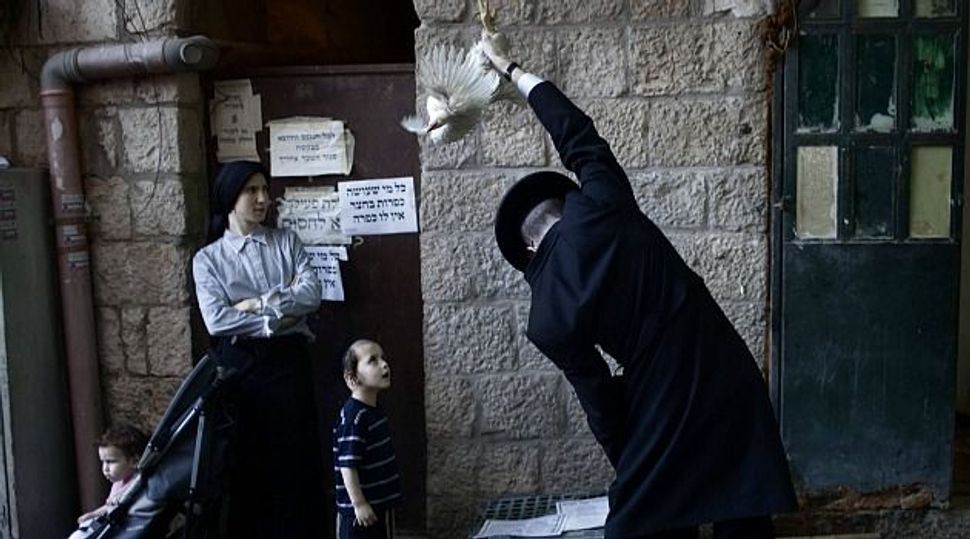Swinging the Chicken for the First Time

Swing Low: An ultra-Orthodox man in Jerusalem performs the pre-Yom Kippur rite of swinging a chicken. Image by getty images
When I was growing up in the 1960s on Manhattan’s Upper West Side, “awe” was a word to be memorized for spelling tests. My High Holy Day memories were of new patent leather shoes, Lichtman’s round raisin challah dipped in honey and a synagogue service that was more “night at the opera” than a meeting between man and his Maker.
My parents were Hungarians, survivors. In those pre-Spielberg/March of the Living years, they didn’t talk about their prewar or wartime lives. In those years, nobody talked. Back then, the goal was to forget the past and start a new life as a good, happy American. One of the few memories that seeped through from their previous lives was of shlugging kaparos, engaging in the pre-Yom Kippur penitential ceremony performed by swinging a live chicken over one’s head.
Decades later, both my parents still remembered all the words of prayer that accompanied the great chicken swing.
“Zoys Kapurasi, zoys temirasi, zoys chalifasi….”
Not that they ever brought a live chicken home for me to swing. Perhaps somewhere in the wilds of Brooklyn people were still performing this ritual, but as far as I was concerned, kaparos were as extinct as Temple sacrifices.
Then I moved to Israel and became religiously devout. While many parts of the Holy Land look more like Los Angeles or Miami, certain Jerusalem neighborhoods seem to have been lifted out of prewar Europe. During the days between Rosh Hashanah and Yom Kippur, these places boast street-side stands stocked with live chickens — for kaparos.
Though I actively sought out all things Jewish, my animal phobia kept me away from kaparos. If a stray cat brushing up against my legs makes me quiver in fear, how could I consider grabbing hold of a live chicken? Besides, there was a perfectly acceptable way out — kaparos with money, swinging a bag of coins over ones head. One animal rights inclined rabbi has even ruled that this method is preferable because he feels that the swing is unkind to the birds.
Then, one year, I was in Geula, Orthodox Jerusalem’s main commercial district, with my then 6-year-old daughter. In between visits to the bakery, the pickle store and the little girls dress boutique, we stumbled upon an open-air kaparos station.
Six-year-olds are generally fascinated by live animals; it’s an age when children love a visit to the zoo. But my daughter wasn’t interested, she was tired and wanted to go home.
I was the one who felt drawn in, pulled by a metaphysical magnet even stronger than my fear. Under the starry sky, surrounded by my daughter and dozens of orange plastic crates full of live chickens, I felt transported to the Hungarian villages of my parents’ youth.
“Could we?” I asked my daughter.
“Is it quick?”
“Yes,” I said, but I didn’t know. I didn’t even know if we would be able to perform kaparos there. Maybe you needed to reserve your chicken in advance.
“No, it’s okay,” the young Hasid in charge said.
The price was reasonable: only the cost of the bird. And afterward a needy family would eat it. I would be fulfilling all three parts of penitence process — prayer, repentance and charity — in one short ceremony.
The Hasid pulled out a plump white hen. All the chickens were white as a symbol of purity. The hen looked reasonably content — perhaps not as blissfully happy as its free-range brothers, but not abused in any way that was apparent to me.
Would I have to swing it? How could I do this without getting scratched or defecated on?
“Help.”
A miracle happened. The Hasid never gave me the chicken. He held it, swinging it lightly over our heads. All my daughter and I had to do was say the words.
For years, I’ve struggled with formal prayers; the holy words fuzz up, and my mind meanders. But now I felt rooted in the text.
“Sons of man… sitting in darkness… bound in affliction and chains of iron.”
I imagined my two grandmothers cremated in Hitler’s furnaces.
“… they are fools… their iniquities cause their own afflictions….”
I thought of all the times I yelled at the kids, gossiped, got angry.
And finally the refrain.
“Zoys kapurasi… This is my exchange*, Zoys temirasi… this is my substitute, *Zoys kapurasi… this is my atonement…this hen shall go it its death and I shall proceed to a good long life and peace.”
We recited the words together, the Hasid swirling the chicken in large, slow rotations above us.
Then it was over.
On the taxi ride home, I felt the same rush of spiritual cleanliness I sometimes experience after Yom Kippur.
“Was it like that for you, too? “ I asked my daughter.
But when I turned to her, she was fast asleep.
Carol Ungar is a Jerusalem-based writer who blogs about traditional Jewish food at kosherhomecooking.com














